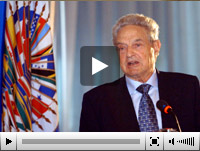- English
Cátedra de las Américas
Decimosexta Cátedra - George Soros
Decimosexta Cátedra - 3 de octubre de 2006
“Retos de la Sociedad Abierta”
Orador: George Soros, Presidente y fundador del Soros Fund y del Open Society Institute
I am basically known in Latin America as an investor and as an outspoken critic of the Bush Administration’s policies, but I don’t think that is the appropriate subject to discuss in this audience. So, I would like to focus on the concept of open society, the work of the Open Society Foundation Network, and its relevance to Latin America. I am not an expert on Latin America, so I will only provide one half of the answers. Maybe the audience can provide the other half through their questions and comments on my speech.
The concept of open society was first proposed by a French philosopher, Henri Bergson, in his essay: “Two Sources of Morality and Religion”. It said that one source of morality is traditional, and that is associated with closed societies; and the other is universal, and that is associated with open societies.
The philosopher Karl Popper, very much influenced by fascism and communism, argued in the 1940s that universal ideas can also pose a threat to the concept of open society, if those ideologies claim to be in possession of the ultimate truth. Because the ultimate truth is not attainable by humans, those who claim to be in possession can impose their will only through repressive measures. He proposed the idea of an open society based on the recognition of our imperfect understanding, which requires critical thinking and tolerance for dissenting opinion, freedom of speech, freedom of association—so, in fact, a liberal democracy.
His book made a big impression on me because I grew up in Hungary, and I experienced at first-hand the Nazi and communist regimes. I became a great devotee of this concept of an open society, and actually, Karl Popper’s philosophy helped me to develop my own: the idea of fallibility and reflexivity, which actually stood me in good stead in the financial markets. When I made more money than I needed for my personal needs, I reflected on what it is that I really cared about. It is this concept—a rather abstract concept—of an open society.
I started my philanthropic work first in South Africa, which had all the institutions of an open society, but it was closed and racialized; then I began work in Hungary and Poland; and then, one thing led to another, and I developed a network within the former Soviet Empire. As the Soviet system collapsed in a very revolutionary period, I established foundations in some 26 or so countries. When things calmed down, I concentrated on the problems of globalization, and, in fact, the foundation went global.
Then, to my greatest astonishment, I found that principles of open society are endangered in my own adopted country, in the most established open society, the United States. I became involved personally and politically, but that is a subject for another day.
I would like to explore the relevance of the open society concept in the activities of the Foundation in Latin America, because now we have a global network, but it is relatively not so much engaged in Latin America. We have an annual budget of about $400 million dollars, but our spending in the Latin America region is less than $20 million dollars. It is around 15 million at the moment.

